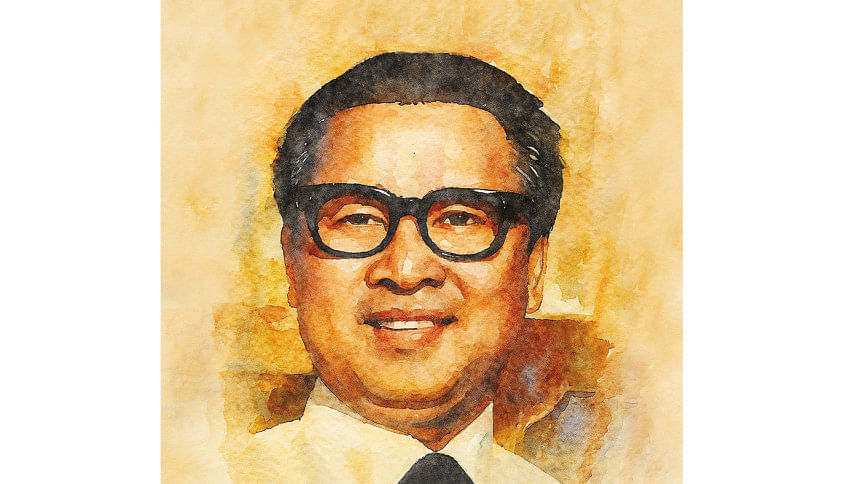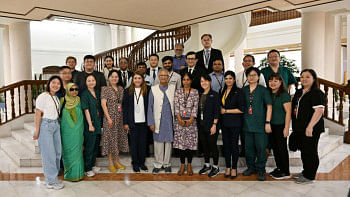Remembering Tajuddin Bhai

I first met Tajuddin Ahmad—or Tajuddin Bhai, as I knew him—in the 1960s, during the pre-Liberation period. After I joined the Awami League, Bangabandhu told me to meet Tajuddin Ahmad, as he would answer all my questions on politics and the party, and that he possessed deep knowledge of both politics and people.
From my first interactions with him, I recognised a man guided by profound political clarity and unwavering principles. Tajuddin Bhai was not merely a politician; he was a statesman whose vision transcended immediate political calculations to prioritise the long-term welfare of the nation and its people. He delved deeply into every issue, studied problems on the ground, and made every effort to understand how people felt about them.
Tajuddin Bhai's vision was already evident during the critical early days of our independence. In 1966, when other leaders met Field Marshal Ayub Khan, it was Tajuddin Bhai who articulated the radical demand for autonomy, laying the groundwork for the historic Six Points. His clarity and resolve demonstrated his remarkable ability to see through political turbulence and articulate a compelling path forward, eventually making the Six Points the cornerstone of Bangladesh's autonomy movement.
In March 1969, at the Rawalpindi Round Table Conference, Tajuddin Bhai's insights and guidance were indispensable. He directed us as we meticulously drafted statements defining regional autonomy based on the Six Points. His careful approach reflected his deep understanding of governance, federalism, and the nuanced balance required between regional autonomy and central authority. These discussions laid the groundwork for the decisions that shaped our nation's future.
I recall his role in issuing directives sustaining the Non-Cooperation Movement in March 1971. Tajuddin Bhai's strategic vision was always clear: maintain pressure through non-violent means while ensuring minimal disruption to essential services. His capacity to balance principle and pragmatism was exemplary.
Once the Liberation War began, as Prime Minister of the fledgling nation, he navigated enormous political and diplomatic challenges with courage, decisiveness, and humility.
Even after independence, Tajuddin Bhai's commitment to democratic principles never wavered. He repeatedly stressed the critical need to energise our political structures with youthful idealism and disciplined commitment to democratic values. To him, democracy was not merely about elections, but about institutional integrity, accountability, and the active participation of citizens in governance—ideals he tirelessly upheld throughout his life.
A defining memory is etched vividly in my mind from 1974 at Washington D.C.'s Dulles Airport. After a high-level international meeting, Tajuddin Bhai, Ambassador M. R. Siddiqi, and I stayed back, deeply engaged in a conversation about the future of our country. With characteristic honesty, Tajuddin Bhai expressed deep concerns about the growing inclination towards a one-party system. His fears were not personal, but deeply rooted in his understanding of democracy. He passionately advocated for reforms, emphasising the urgent need to revitalise political structures through engaging young people—idealistic, dedicated, and committed individuals who could breathe new life into the democratic foundations we had worked so hard to establish.
Tajuddin Bhai's resignation later that year deeply saddened me. I recall rushing to express my concerns, sensing a great loss not just for the government but for the entire nation. Later, visiting him at home shortly after his resignation, I found him at lunch—calm yet resolute. His departure was not about personal differences, but stemmed from his unyielding commitment to democracy, accountability, and transparency. His actions were a testament to his integrity and remain a powerful lesson in selfless leadership.
Tajuddin Ahmad's legacy resonates profoundly today. He was a man ahead of his time, recognising early that lasting progress demanded not only independence but robust, accountable, and inclusive political structures. For all of us today, and particularly for young people who will spearhead efforts to shape our country's future, his unwavering belief in the power of democratic principles, his uncompromising integrity, and his exceptional courage should continue to serve as a guide.
Dr Kamal Hossain is a Senior Advocate of the Supreme Court of Bangladesh, an eminent jurist, and one of the principal architects of the Constitution of Bangladesh.

 For all latest news, follow The Daily Star's Google News channel.
For all latest news, follow The Daily Star's Google News channel. 



Comments